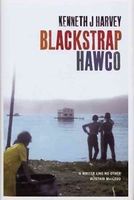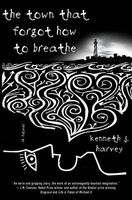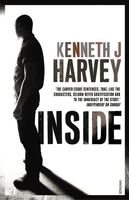Zero Sum Game
By Koom Kankesan
Kenneth J. Harvey's artistic resume runs the length of your arm. For someone who has achieved so much, in the realms of literature and filmmaking, you'd be surprised at how strong his feelings are about the state of Canada's cultural institutions. During our brief exchange, I could almost imagine him thinking: 'What do I think of Canadian culture? Why, I think it would be a swell idea!'
An outspoken iconoclast, Kenneth created and administers the ReLit Awards. The slogan for these awards is "Ideas, not Money." True to their motto, the prizes were started as an antidote to big prize galas such as the Giller and the Governor General's.
Sidestepping CanLit's big shiny glass ceiling, built with a one-way reflecting tint enabling those below to gaze enviously up at the initiated, while protecting those above from having to remember and identify with their inferiors, the ReLit celebrates the best in small publishing. The award is a silver ring with four dials, each stamped with the entire alphabet. It is a gift of language, in return for language, not prize money. The dials of the ring revolve to construct words.
Kenneth communicated with me from Newfoundland where he is busy working on two documentaries: I Heard the Birch Tree Whisper in the Night, and The Drinking Life.
When I asked Kenneth about the origins of the ReLit Award, he directed me towards a piece he had written for the Globe & Mail in 2000 called Book awards: Who needs them? Here are some highlights:
What about the hundreds of writers published by the 40 or more independent presses stretching right across Canada? Not one groundbreaking book was nominated for a Giller or G-G this year. Can anyone, in all honesty, claim that there was not one commendable book published by the independent presses in this country, one book worthy of rubbing elbows with the books brought out by multinational publishers such as McClelland & Stewart (now partly owned by Random House), Doubleday and Knopf?
Multinational publishers have more money to promote their books, to run half-page ads on book pages of national newspapers, to attract the attention of journalists who probably work for divisions of the same multinational companies. They can use their foreign money to let everyone know how great a book is and, subsequently, dominate the media and public opinion.
When I announced the formation of the ReLit Awards for independent presses only, cash prize ($1), I received spirited praise from over half the independent publishers in this country.
Your CanLit News
Subscribe to Open Book’s newsletter to get local book events, literary content, writing tips, and more in your inbox
Why hasn't something like the ReLit Awards ever existed? Because the majority of those in the literary community are a timid bunch, afraid to speak up for fear of treading on someone's toes, and that might mean they won't get shortlisted for a big-money prize or they won't be awarded a Canada Council grant or they won't get invited to read at a particular literary festival.
He also sent me the copy of a previous article he had written for The Globe & Mail. Its original title was Who Cut the Balls Out of M & S but the Globe ran it as McClelland and Stewart’s Kingdom of Beautiful Books. Once again, some highlights:
What has become of Jack McClelland’s rebel streak? Who cut the balls from M&S? Over the years, writers, editors and publishers have expressed similar concerns about the mighty M&S. They claim that Ellen Seligman, Editorial Director of fiction, is responsible for homogenizing Canadian literature, that she is afraid of gritty, raw, unabashed celebrations of passion.
Gone are the rowdy, experimental, and explicit books, the cutting-edge writers who have shaped the face of contemporary literature, fearless writers with lyrical gifts and the courageous vision to see beyond the fashionable literature of the time. What we have now, in place of anything slightly provocative, are M&S novels that are poetic, sensual and profound. M&S short story collections that offer eloquent tributes to human tragedy. Brave and compassionate M&S books. M&S bestsellers that are delicate, yet deeply-moving, life-affirming shrines to the indestructibility of the human spirit. What ground-breaking works of fiction has Ellen Seligman edited lately? I cannot name one.
Without question, Ellen Seligman has done more for Canadian literature than any editor in Canada and she is greatly responsible for the phenomenal success of Canadian literature abroad. But what image has been propagated? Safe, sterile, inoffensive. Is it because the landscape of Canadian literature has changed so dramatically and readers want that preciousness framed in stained glass and aspiring to the hush of museums and classrooms, or is it because Ellen Seligman is imposing her taste on the general readership?...There is plenty of tough female writing out there and plenty of women readers who love tough writing. However, writers such as Andre Alexis, Rohinton Mistry, Shyam Selvadurai write in a pervasively sentimental style, rendering an acute emotional daintiness with no sense of unbridled passion: no fuck juice.
M&S writers have a disproportionate place among Giller Prize and Governor Generals Award nominees. M&S controls the prestigious New Canadian Library series, whose editorial board selects which books will be enshrined as CanLit classics. If the literature of confrontation rates a big fat zero at M&S, what does it tell you about the subjugation of cocky new voices? Ellen Seligman’s power over young Canadian writers is alarming. Reading the successful-- and often brilliant-- works of The Eloquent Elite, young writers assume they must write in a similar vein in order to write “literature”. They harness, neuter and purify themselves, creating heavenly literature where even insanity is poetic, where the rhythms of loss are fluent, where the ravages of death are miraculously articulate, where sex is visually curbed. Everything explicit is glossed over. They create poetic versions of Disneyland.
Kenneth: As you might imagine, the above article did me no good. While I was writing the article, I interviewed Ellen Seligman, asking her to name one cutting-edge author in her M&S stable. Jack McClelland had many. Ellen thought for a while, but could not give me an answer. When I mentioned that all of her writers were feminized and eloquent, and that she could not name a single cutting-edge writer that she published, she said: "Kenneth, do you ever want to be published by McClelland & Stewart?"
Koom: Well, that question, "do you ever want to be published by M & S?" says a lot, doesn't it? The article is quite provocative by Canadian standards. It's a gob of spit in the eye of the Institution of Canadian Literature. The Institution is not only something that applies to Literature. It's a very Canadian thing, I find. As someone who's an immigrant and has always been on the outside, I find Canadian society, whether we're talking about art or commerce or opportunity & innovation, too often to be a small, closed-off, circle. Despite the fact that everybody loves Canada, we think of ourselves as small. We create Small Ponds of our institutions. The M & S that you were talking about under Jack McClelland's stewardship came out of the sixties and Canada's centenary. Everything was about bursting out. Now, I think Canada is about reining in, shoring up, propping the established order. Maybe it's a global thing too - neo-conservatism and the global economy makes everyone afraid for our livelihoods and careers. We let fear make caterers out of us.
Kenneth: Excellent thoughts and words. I think it's about the reign of the monopoly taking hold, as well. Monopolies are anti-artist, anti-creation. We see it more and more pervasive in publishing houses (Random House/ Penguin group owning all the imprints, Random House, M&S, Doubleday, Penguin, Knopf...) and TV stations (Bell Media owning practically every station). Through this imposing structure, sensibilities are seriously limited.
Koom: You started the ReLit Awards as a statement, almost a manifesto, against the GG and Giller media domination, the act of fashionably lavishing attention on the same authors. Your prize comes with no money and is aimed at those who are published through independent presses. What impact has the ReLit had over the last sixteen years?
Kenneth: Since the establishment of the ReLit Awards and the ensuing publicity, I believe jurors in all other prizes have taken note that books by independent presses are of equal quality to those published by the larger presses. Subsequently, we are seeing more and more small press books on Giller and GG lists, and coming through as winners. It appears to be that way, have a look and do the math.
Koom: That is true. I've noticed that as well. On the other hand, has there been any push back from the established literary scene? Have you encountered any incidences of negativity, hostility, or sneering as a result of pushing for the recognition of independent publishing?
Kenneth: My career has suffered because I wrote that article. I have heard this from members of the press and others. But that is the price you pay for speaking out, even in a democracy of liberal-minded people.
Koom: I was wondering if this might be the case. Would you feel comfortable expanding in detail? The piece from 2000 is very bold and striking. Its bravery is to be commended as it requires a certain amount of guts.
As Canada celebrates its 150th anniversary now, it'd be nice to see things change direction, to see a second flowering. I don't know if that will happen anytime soon. Look at what's happening south of the border. Everybody wants their fifteen microseconds of fame. They'll sell themselves for it. How do you find the world of film in comparison to that of writing? I would think that the film industry, perhaps because it's more porous with the North American scene, as opposed to being rigidly Canadian, might be more fluid. Also, film is a still fairly accessible medium in terms of time and education and all that. Although, the number of people seeing indie films is still abysmally low.
Kenneth: We are America's bitch when it comes to any entertainment industry. They own us. 98% of the screens in Canadian cinemas screen American movies. The only viable entertainment sector that is not a laughing stock is the music industry because of Cancon regulations imposed on radio in the 1970s. Otherwise American record labels would be shoveling more American artists down our throats, instead of having to set up shop here and develop Canadian talent, as they were forced to do.
The author photo attached to this post, of Kenneth directing his feature film The Immigrant's Handbook, was taken by Channy Anand.
The views expressed in the Writer-in-Residence blogs are those held by the authors and do not necessarily reflect the views of Open Book.
Koom Kankesan was born in Sri Lanka. While his family lived abroad, the civil war in Sri Lanka broke out and this caused them to seek a new home. They eventually settled in Canada and have lived here since the late eighties. He has a background in English Literature and Film Studies. Koom contributed arts journalism to various publications before becoming a high school teacher in the Toronto District School Board. Since working as a teacher, he has taken semesters off now and again to work on his fiction. The Tamil Dream, his new book, is his most ambitious to date. It looks at the end of the civil war in Sri Lanka and how it affected Tamils here in Canada. Besides literature and film, Koom has deep interests in history and science, and an enduring love for comic books.
You can write to Koom throughout January at writer@open-book.ca.






